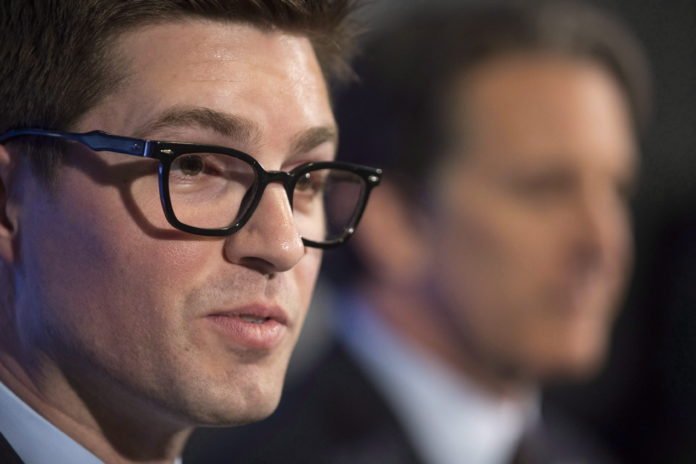
In his post-trade deadline media address, Kyle Dubas discussed the team’s new additions, the aggressive spending of draft-pick capital, his reasons for the faith he’s shown in his team, the plan for Frederik Andersen for the rest of the season, and much more.
Opening Statement
Over the course of the last several days, we have been able to add to our program forwards Riley Nash, Nick Foligno, Stefan Noesen, Antti Suomela, defenseman Ben Hutton, and goaltender Dave Rittich. We are obviously excited to be able to add those players to our group and have them join the group as soon as possible.
From my end, I felt that this group of players and coaches deserved every effort on our end in management to bolster the team and try to give us as great of a chance as possible down the stretch in our division and into the playoffs. We were excited to be able to, we believe, add the pieces that will continue to enhance our ability to be as competitive as possible as we go into the playoffs and roll from there.
Dubas on the additions of Foligno, Nash, Hutton, Rittich
To what extent were you able to satisfy the pieces you were looking for? There are some great expectations for Nick Foligno and what he can bring to your lineup, but everywhere else, are you satisfied that you were able to add what you wanted?
Dubas: Our view of what we needed has changed as different players have stepped up and different players have developed over the year. Different guys have jumped into roles and excelled. Injuries influence matters as well. Certainly, Alex Galchenyuk’s rise to prominence on our roster altered a little bit of what we were looking for and really let us focus up front on the thing that I really felt we needed from the beginning: To try to find a player that can play up and down our lineup, that has tremendous character and competitiveness, defensive responsibility, and also has skill and the ability to play with any of our top-three lines. That was accomplished with Nick.
Sheldon and I have talked since the summer about adding a defensively responsible right-handed center. Riley Nash accomplished that for us. We then shifted our focus to goaltending. As we have lived the whole year with injuries at different times to Jack and Fred, the one thing we didn’t want to do is get down the stretch and into the playoffs and regret not bolstering it. That is why we elected to move with David Rittich with Calgary. Today, we shored up our depth on defense with Ben Hutton.
We are content with the way things have gone. Obviously, we expended a lot of draft capital to make it happen. That will place pressure on the organization elsewhere, but I think coming off of the draft we just had, we had a lot of picks and the early returns we feel have been promising. We obviously have to continue to develop those players, but we felt it gave us a little bit of flexibility here in the last couple of days to get to work and try to improve the team in those areas.
What stands out to you about Nick Foligno’s game that made him worth the price you paid?
Dubas: There are a few things. One is that you know what you are going to get from Nick every single night. Our expectations are that he will come in and do everything that he has done in his career in Ottawa and Columbus. The way that he plays every single night you can rely upon in terms of his effort level, his work rate, his responsibility defensively. He is able to play against anybody in the league, kill penalties at a high level, and most importantly, he is able to make plays when he has the puck.
The energy and grit that he brings to a team are infectious within the group if you talk to players and coaches that have had him before. In terms of character that he has, in talking to people when you are gearing up to do these things, one of the important factors was that the people that are coming into the room are able to fit into what we are doing, become a great part of it, and enhance what we feel is already a really good thing that is happening.
It was all positive on that end with Nick. On and off the ice, those are the things we are expecting from him — just what he has done his whole career in the NHL.
Foligno is the fourth former captain you have added to the leadership group. He impressed a lot of the media on his conference call. Can you talk about adding another voice there? Even if Joe Thornton’s playing time might be reduced a little with these moves, what are his contributions still to be made to the team?
Dubas: I don’t think you can ever have enough guys who possess leadership. You talk about the four players — John is the captain, Joe and Jason have been captains, Nick was as recently as yesterday — but I also think there is a group forming here of players who could be captains. You never know how things are going to work out, but they could certainly fill that role.
We are really, really fortunate with the different styles of leadership we have in the group as well. Jake Muzzin brings a lot in terms of leadership. He is very different in terms of Zach Hyman, who brings a lot in terms of leadership. Mitch and Auston are continuing to evolve. You have Morgan as well. I think we are very fortunate to have the calibre of quality people that are here. It makes it very, very easy to work and manage and coach them. They hold each other accountable and call each other out on different things — especially the younger guys, who are starting to mature into that.
Having examples for them to follow as we really get rolling with this thing, and as those players enter their prime, is invaluable to the growth of the program and the club.
With regards to Joe’s playing time or anybody’s playing time, we have so much to work through here with different quarantines and things of that nature. Joe is the exact same every day regardless of what his position is. He has come here for a reason, which he stated repeatedly. He is willing to do whatever it is on and off the ice to get there at this stage in his career.
Even when his playing time isn’t what it has been in the past, it has no impact on Joe’s energy and who he is each day. I think that has been just wonderful for our entire group to see.
What made Ben Hutton an attractive defenseman to add?
Dubas: The thing with Ben — in the summer of 2019, he was available and signed with LA. We investigated signing him. We made trades that offseason that brought in two defensemen in Cody Ceci and Tyson Barrie. That was what we went with at that point. We were also having Travis Dermott come back early in the year, and we didn’t want to block him out coming off of injury in 2019-20.
Ben had been on our radar. We watched him last year in LA and this year in Anaheim. We just think he is able to play up and down the lineup. Last year in LA, he had a strong run of games with Drew Doughty. He is able to come in, kill penalties, and play that sort of role.
We felt, in terms of depth, we have a lot of guys who can come in and play on the power play and play more offensive minutes. We wanted to bolster what we had defensively. We felt that over his career, he has done that. That is what led us to Ben down that path with him. We welcome him from Anaheim to Toronto.
Do you think Hutton can compete for a lineup spot immediately?
Dubas: He is going to have to serve the quarantine, get through that, and be ready to roll. I am not naive. I think we have been very fortunate with our health on the blue line. We obviously hope that continues, but we also hope that we continue to work guys in here as the season comes down the stretch and give a little bit of life to guys who have sort of been in and out or getting some games with the Marlies — Marincin, Liljegren, and once Sandin gets healthy, hopefully, we can work Rasmus in as well. I would expect Ben will compete with the group. If he wins the spot, that is great for him and great for our depth.
Dubas on Frederik Andersen’s status
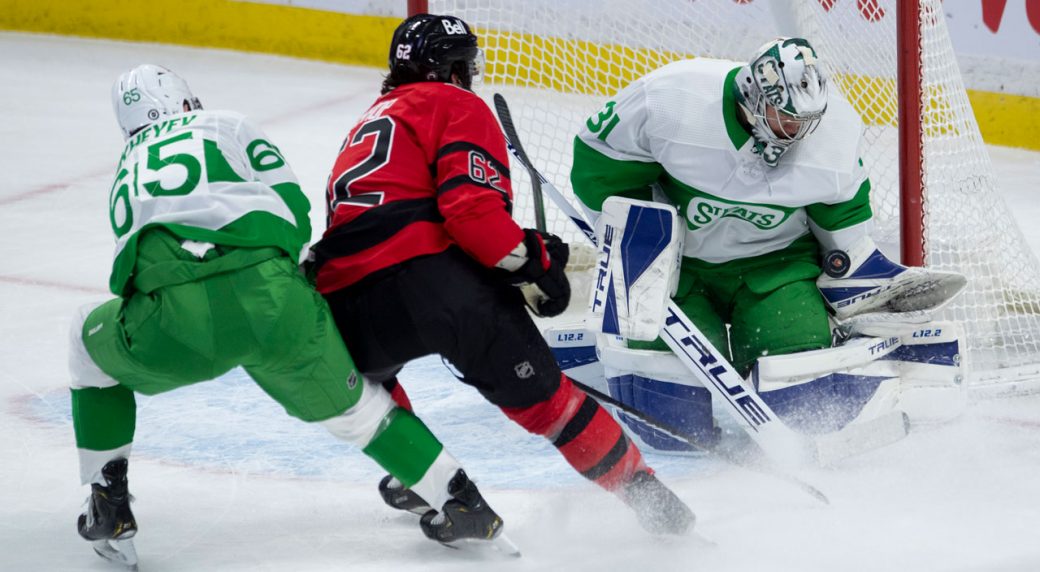
What clarity do you have on what Frederik Andersen is going through right now and when he might be available to return?
Dubas: The situation with Fred has really not changed. He has carried a tremendous load for us over the last four-and-a-half seasons. Our main ambition with Fred now — he played last on March 19th, and with that said and with the season where it’s at with four weeks to go, patience and making sure he is at 100% is the key for us. That is really all we are focused on at this point: Making sure that we get through the stretch and give him the chance to be at absolute 100% and be ready to roll come playoff time.
He is a huge, important part of what we do here. We wanted to bolster that position, but when it comes down to it, the goaltenders that have been here have been the ones that have led us to this. This was done to support them, help them, and support the group overall. When it comes to Fred, we just continue to focus on getting him 100% healthy and being ready to roll for us at the most important time of year.
When do you expect Andersen to get back on the ice?
Dubas: Once the medical team gives him the green light to get back on the ice, that is when he will be there. Our goal is just to make sure he is 100% healthy here and is at his best when the team needs him the most come playoff time. I don’t have a definitive timeline on it.
For everything Fred has done for the organization over four-and-a-half years, as I have said many times, our focus on this is patience and making sure he is back at 100% and not really putting a huge amount of pressure on him to do that. That is why we went out and got Rittich to be able to come in here with Jack and Hutch and form a really solid threesome of goaltenders before Fred gets rolling.
Are you completely convinced he will be back playing for the Leafs in this regular season?
Dubas: I am convinced that Freddy is going to play for the Leafs for sure. Whether it is here in the next number of weeks or in the playoffs, that will be up to the medical staff and Fred to decide.
It is a different year this year. Jack has been outstanding — there is no other way to put it — since he has come in. All of what that does, in talking to Fred over the last number of days… Fred is rooting for Jack, and it takes the pressure off him. In the past, there was always the pressure on Fred to play, play a lot, and come back as soon as possible from every injury. With Jack playing the way he has and with Dave coming in, it will allow us to be slow and cautious with Fred and make sure he is absolutely at 100%.
For once, from our end, we can do right by Fred for someone who has done so much for the organization. That includes, from his end, really pushing himself to play a lot of games and pushing himself to come back from injury as soon as possible rather than when is always ready. We owe that to Fred. That is the way we are going to handle it.
Dubas on the unique deadline, trading away draft-pick capital, keeping his top prospects, Brandon Pridham’s value & the plan for Rodion Amirov
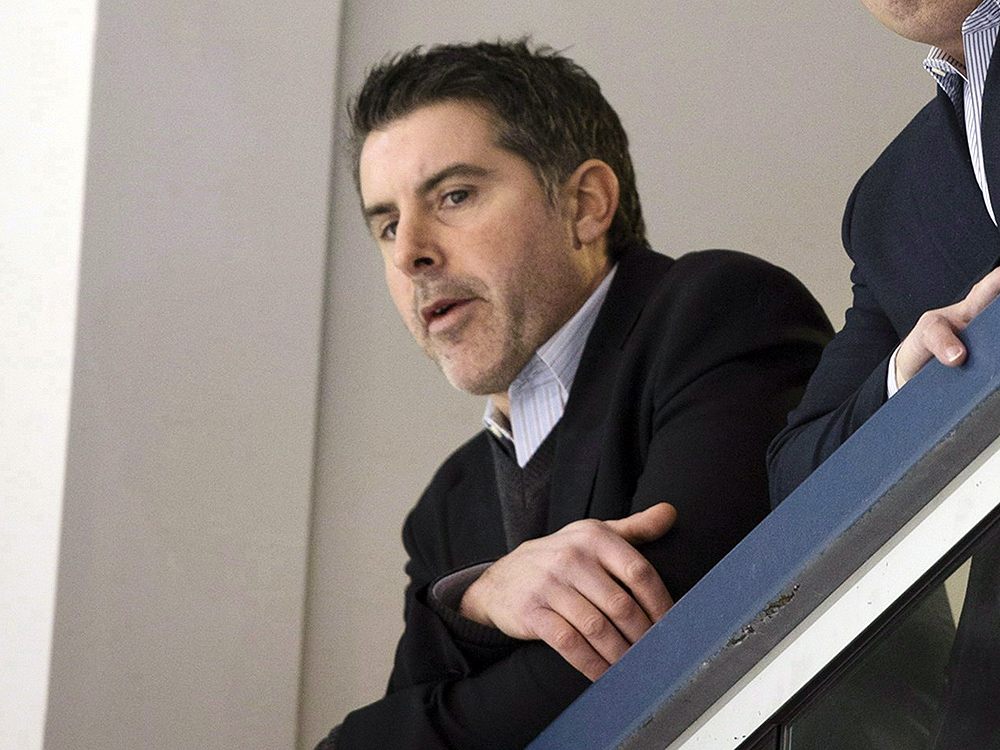
You spoke of the idea of a top prospect being on the table if it was to come to that. How happy are you that you didn’t have to go down that route in the last 24 hours or so?
Dubas: One of the major things that we were trying to do if we could was get through the deadline with the group intact. The players could answer this better, but just in my observation, it is one of the tightest-knit groups we have had. The spirit and the vibe of the team are very, very good. I didn’t want to take anybody out of that.
If we had to choose between our prospects and draft capital… Of course, you are trying to make an objective assessment, but the players we have in here are already known people, players, and athletes to us. We know what we have in them and we know what their work ethic and habits are like. We know where they are at developmentally. In the case of all of those players, we were hoping to get through the deadline without having to move any of them and to just continue to develop them.
It wasn’t an absolute non-starter for us, but we are excited that we got through the deadline with those prospects still a part of our system.
How would you say your stance or approach to the deadline has evolved over the years?
Dubas: When I first started here working with Dave Nonis, we were a seller. In the first year with Lou, we were a seller. In the second year with Lou, watching him and the way he operated, he felt the team had earned the ability for us to go out and get something. We added Brian Boyle. The next year, we added Tomas Plekanec.
In the previous two years, we acted a little early. It just wasn’t available this year, as you all saw. We added Muzzin, Campbell, and Clifford a month out in the previous two years. We just had to evolve in terms of the comfortability of getting close to the deadline.
Honestly, the coaches and players, with the way they’ve operated every day and the way the team came out of playing poorly in the early part of March, made me really comfortable with what we have going here in terms of their ability to withstand times when our form maybe isn’t the best. The way that the locker room operates made me a bit more comfortable getting closer to the deadline before we did anything.
The way that the group has played this year and operated this year has made me more comfortable with adding what you would commonly refer to as rentals to our group.
What was this deadline like compared to other ones you have been involved with considering the quarantine, the flat cap, only playing within the division, and teams not knowing exactly what they have?
Dubas: I haven’t seen the total number of trades today. I can’t answer it definitively. Once we had completed the last two trades late in the day today, it felt a little bit quieter. It is so hard to speak about what is happening with the other 30 clubs. There are a number of factors that may influence what you are referring to: expansion, the flat cap, the fact that if you are not in the playoffs, you can look ahead and see games against those teams on your schedule. All of those things combined to maybe reduce the amount of activity.
It didn’t feel that way to me today, but our situation was one in which we were looking to add and were in the mix on a lot of things. I can only speak from our end, and I don’t want to unfairly characterize the other clubs and what they were going through.
Did the reduction of the quarantine from 14 days to seven days help justify the buying?
Dubas: I think so for sure. The way we look at it: Obviously, the players are coming in. The protocols that the players are under are testing twice daily with two types of tests here. We have that on the go. They are bound to their home like anybody traveling in. Like all of our players now and most people in Ontario, they come to the rink, and then that’s it. There is not a whole lot to do, and it feels very safe that way.
Had it gone to the 14 days, I think it would’ve put all of the Canadian teams in a more difficult spot. If you acquire a player today, by the time they’re organized — especially for a situation like Nick’s with a family and three children — and through the 14 days, it’s April 27th. You don’t have a lot of games and practices to get up and running before the playoffs.
It certainly would’ve been reflected in the price we would’ve been willing to pay — more so if we came down to today. It probably would’ve expedited things a bit sooner in terms of the deadline and when we were looking to do things.
You have always been complimentary of Brandon Pridham. That was even before there was a flat cap or a lack of revenue due to fans not coming in the building. Does he deserve a Hart Trophy for capologists with what he has been able to do?
Dubas: It is tough to even put into words what it is like to work with Brandon. The ideas that he comes up with, the information he is able to give me to make my job as easy as possible, his ability to challenge me or tell me when he thinks we are going down a path that might not be best, and really optimize our roster and cap space — he works tirelessly at it.
We have been here basically the whole time together — about a month’s difference — and the amount I learn from him and the value he brings to the organization and everybody in management is tough to put into words. We are just extraordinarily thankful to have him. I couldn’t imagine doing the job without him. He is an indispensable part of the group.
I have never worked with anyone else in that realm. I know here in Montreal they have John Sedgwick. He is excellent as well. Any of us who do this job without having someone of that calibre in that role is definitely shorthanded. I can’t tell you how much I appreciate Brandon on this call. Whatever awards there are for that position, I would certainly think he should win them.
A lot has been made about the fact that you have just six draft picks over the next two drafts. Does the fact that there are fewer teams playing and scouting has been a little bit more difficult factor into the decision to trade as many picks?
Dubas: I don’t think so. You never hope to get to that point where you have so few draft picks. We are coming out of a draft where we had a surplus of draft picks. Seeing those players develop in their seasons, respectively, has been very encouraging for us. Everybody is always happy with the way their draft went, especially recently, but we have been especially happy with the way the players have performed going back to October through to now. That makes us a little bit more comfortable knowing we have those players coming into the system.
We have more players coming into the system from previous drafts that are going to be entering the system starting next year. We signed Alex Steeves out of Notre Dame a few weeks ago. That just gave me a little bit more comfort. How it stands now might not be how it stands as we get to the draft, but I also think that given the uncertainty and the fact that leagues have been going in fits and starts predominantly in North America, it would make our program a good landing spot for any undrafted players or draft-related free agents as well.
We will shift our focus there. I know John Lilley and the scouting staff, for my money, have done a great job. I am thankful for them and believe they will make the most of those picks. We will also shift our focus to being really competitive on the tryout front and free-agent front to try to maximize our ability there.
With the KHL season finished, what is the organization’s plan for Rodion Amirov this season?
Dubas: It is a bit of a challenging one. He is not signed yet. When signing a Russian player, especially one that is in Russia, it is a challenge. Reid Mitchell deals with this on our staff and does an incredible job of trying to get the players a Canadian visa. Especially during the pandemic, it has been even more complicated.
Our plan right now is to continue to work with Dan Milstein and Ufa to see if we can get Rodion over to North America. Unlike other years, he hasn’t even been here yet. The draft was in October, and their season was rolling along. We were really happy with how his season went overall and thought Ufa did a really good job, especially with such a young player, of bringing him along.
He had the great tournament at the Karjala Cup. He had some ups and downs at the World Juniors. They did a really good job of developing him there, especially as a young player. Our plan is to get him over and around our people as soon as we can, but we will work with Dan Milstein and Ufa on that here. Now that we are through the deadline, that will be where our focus will be shifting to.
Dubas on the team’s versatility come playoff time, ability to withstand injury
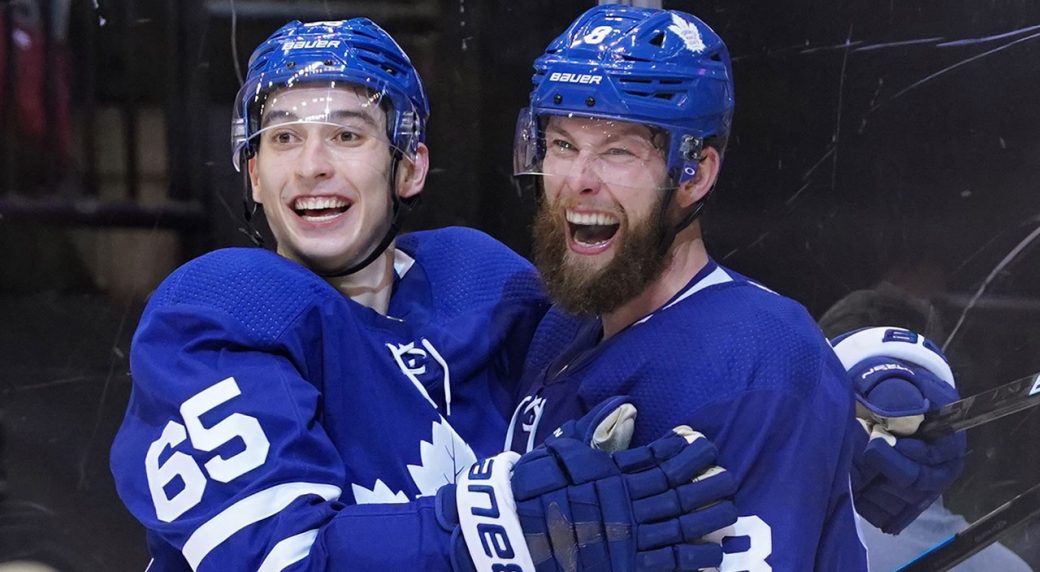
Given some of the moves you made during the offseason, is this the most versatile team that you have had in terms of being able to play wide open, tight defensively, and physically? There seems to be so many layers to the team right now in terms of versatility.
Dubas: I think it is just trying to learn from the way things have gone poorly in the past number of years in all of the four seasons we have been in the playoffs and playoff qualifiers in my time here. You are trying to learn how we can better get through the regular season without as many lulls. We talked about that going back to before the season — the importance we were placing on the regular season, and why that is so vital to setting us up.
One of the things we talked about in the offseason is that we felt like we needed to become more versatile with the roster. We needed to add better experience and guys with more spirit and energy. Now, it is just trying to take the year and find what may be missing.
Certainly, when we get into the playoffs, we are going to need all of those elements you talked about — the defensive play, the goal scoring, the toughness. It is going to be harder to score goals. It is going to be harder to defend. The games are going to become far more physical. We have tried to address that going back to adding Muzzin two years ago, Kyle Clifford last year, Simmonds and Bogosian in the offseason, Foligno today, even Stefan Noesen here in the same deal as Nick Foligno, and Riley Nash on the defensive side.
We are trying to be ready for anything. I don’t think it can ever be perfect. You don’t know the opponents. You don’t know where we are at. Our focus right now is using these remaining games and being as ready as we possibly can for, 1) locking ourselves into a playoff spot and getting in first; 2) locking ourselves into as good of a position as we can within the division.
Once we get into this final stretch, we play Montreal a lot. We have another four games against Winnipeg. It is going to be a strong test down the stretch as well. I am looking forward to seeing how the group responds. Once we get there, if we can take care of business here, it will be about using all of those elements to be at our best.
We think we have addressed some of the deficiencies we have had. More will come up, and it will be up to us to address them internally here through development, coaching, and accountability the rest of the way.
You lost Jake Muzzin in last year’s play-in series, and Colorado lost their goalies in last year’s play-in. How much did that emphasize that you needed to upgrade your depth on defense and in goal today?
Dubas: The way that I have looked at it, rightly or wrongly — I don’t want this season for the group to come down to injuries or issues of depth or anything like that. It is hockey, it is competitive, the schedule is going to be very compressed, and it might. But I thought the group had done such a strong job so far during the season with the way that they have played and have acted on and off the ice.
I looked at my job as trying to make sure they had every chance possible to see it through, whatever that outcome may be in the end. When we got together and looked at it, we were trying to accomplish a number of things in goal, on defense, and up front so that no matter who gets injured or goes out… You are never going to be able to replace a Jake Muzzin when he goes out, or if you’re Colorado, when a starting goaltender — or two of them — go out. But in order to build the greatest chance we have so that those types of things don’t derail a season, we wanted to make sure we are as covered as possible.
Things that happen always influence the way you behave. The way we acted this year or tried to act is to ensure that different things that may happen don’t cost the team. If we are going to give ourselves the best chance to have success, as we all know, as we go down the stretch and into the playoffs, different things are going to happen. Injuries are going to happen. Different players are going to step up. Other guys are maybe going to have a dip in their form. We wanted the locker room and Sheldon to have as many options as possible to remain as competitive as possible.


![Sheldon Keefe on the Maple Leafs’ struggling power play: “[We’ve scored] one out of 11 high-danger chances in tight to the net… We have been in those spots and haven’t converted” Sheldon Keefe, playoff press conference](https://mapleleafshotstove.com/wp-content/uploads/2024/04/keefe-pc-game-3-218x150.jpg)
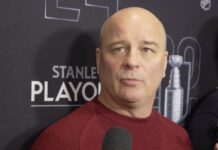
![Jim Montgomery Post Game, Bruins 4 vs. Leafs 2: “[Marchand] still manages to get under people’s skin, yet he doesn’t cross the line” Jim Montgomery, Boston Bruins post game](https://mapleleafshotstove.com/wp-content/uploads/2024/04/jim-monty-pg-to-218x150.jpg)
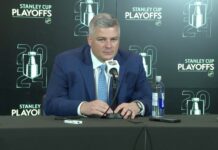





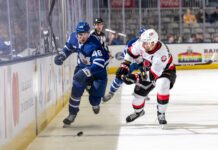













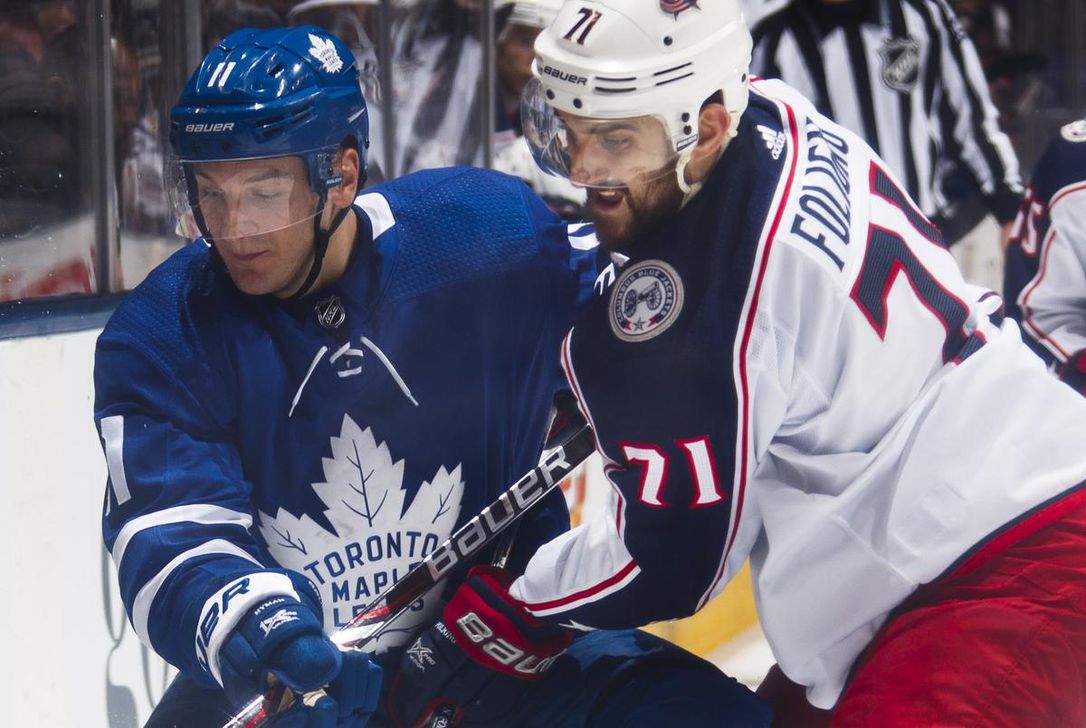
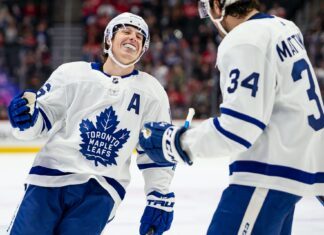

![Sheldon Keefe on the Maple Leafs’ struggling power play: “[We’ve scored] one out of 11 high-danger chances in tight to the net… We have been in those spots and haven’t converted” Sheldon Keefe, playoff press conference](https://mapleleafshotstove.com/wp-content/uploads/2024/04/keefe-pc-game-3-100x70.jpg)



![Jim Montgomery Post Game, Bruins 4 vs. Leafs 2: “[Marchand] still manages to get under people’s skin, yet he doesn’t cross the line” Jim Montgomery, Boston Bruins post game](https://mapleleafshotstove.com/wp-content/uploads/2024/04/jim-monty-pg-to-100x70.jpg)

